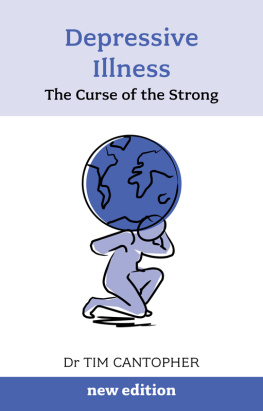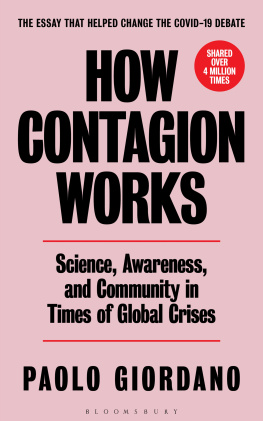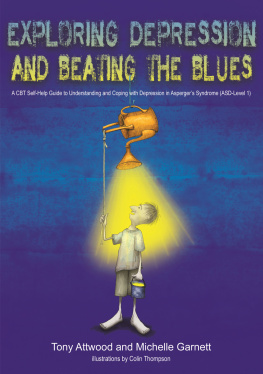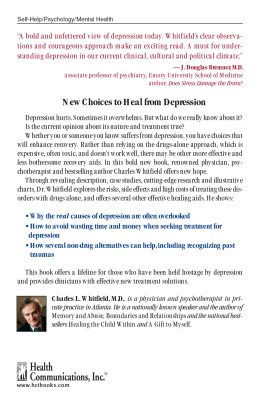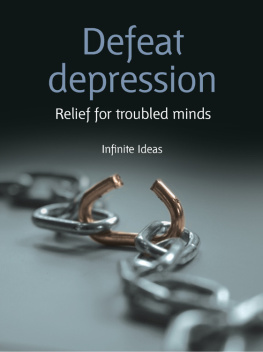Tony Giordano - Its Not All In Your Head: Unearthing the Deep Roots of Depression
Here you can read online Tony Giordano - Its Not All In Your Head: Unearthing the Deep Roots of Depression full text of the book (entire story) in english for free. Download pdf and epub, get meaning, cover and reviews about this ebook. year: 2010, publisher: John Hunt Publishing, genre: Religion. Description of the work, (preface) as well as reviews are available. Best literature library LitArk.com created for fans of good reading and offers a wide selection of genres:
Romance novel
Science fiction
Adventure
Detective
Science
History
Home and family
Prose
Art
Politics
Computer
Non-fiction
Religion
Business
Children
Humor
Choose a favorite category and find really read worthwhile books. Enjoy immersion in the world of imagination, feel the emotions of the characters or learn something new for yourself, make an fascinating discovery.

- Book:Its Not All In Your Head: Unearthing the Deep Roots of Depression
- Author:
- Publisher:John Hunt Publishing
- Genre:
- Year:2010
- Rating:4 / 5
- Favourites:Add to favourites
- Your mark:
- 80
- 1
- 2
- 3
- 4
- 5
Its Not All In Your Head: Unearthing the Deep Roots of Depression: summary, description and annotation
We offer to read an annotation, description, summary or preface (depends on what the author of the book "Its Not All In Your Head: Unearthing the Deep Roots of Depression" wrote himself). If you haven't found the necessary information about the book — write in the comments, we will try to find it.
Only by discovering the origin of his depression in childhood trauma was Tony Giordano able to defeat this misunderstood illness.
Tony Giordano: author's other books
Who wrote Its Not All In Your Head: Unearthing the Deep Roots of Depression? Find out the surname, the name of the author of the book and a list of all author's works by series.
Its Not All In Your Head: Unearthing the Deep Roots of Depression — read online for free the complete book (whole text) full work
Below is the text of the book, divided by pages. System saving the place of the last page read, allows you to conveniently read the book "Its Not All In Your Head: Unearthing the Deep Roots of Depression" online for free, without having to search again every time where you left off. Put a bookmark, and you can go to the page where you finished reading at any time.
Font size:
Interval:
Bookmark:
Special thanks go to three people who graciously took the time to read earlier versions of this book and provide invaluable feedback and suggestions: Bruce E. Levine, PhD, a clinical psychologist and author of several books and articles on mental illness; David A. Karp, PhD, professor of sociology at Boston College and author of numerous scholarly articles and books; and Charles L. Whitfield, M.D., a physician, psychotherapist and author of a number of well-known books on mental illness and recovery.
Id also like to acknowledge several others who were essential in bringing this book to fruition. My agent Krista Goering of The Krista Goering Literary Agency has patiently guided this novice author through the daunting process of getting published. John Hunt of O-Books was also indispensable in answering my many questions and helping me through the nuts and bolts of bringing a book to market. I also want to express my gratitude to Mary Quirk, M.A., L.P.C., N.C.C., a counselor who showed me extraordinary empathy, a rare willingness to listen to my problems, and the know-how to find solutions.
In particular, I have to extend my deepest appreciation to my wife Joanne for her patience and support in the two-plus years when I often hid in the basement office to work on this book. Writing a book seems to require that you hurriedly get fleeting ideas down on paper before you can share them with anyone, lest you forget a key point. So, I was especially isolated and unavailable during this time.
Finally, grateful acknowledgement is given to the following for permission to reprint passages:
Charles Whitfields passages from his book Healing the Child Within, 1987 Charles Whitfield, Health Communications, Deerfield Beach, FL.
Charles Whitfields passages from his book The Truth About Depression, 2003 Charles Whitfield, Health Communications, Deerfield Beach, FL.
Bruce Levines passages from his book Surviving Americas Depression Epidemic, 2007 Bruce Levine, Chelsea Green, White River Junction, Vermont.
David Karps passages from his book Speaking of Sadness, 1996 David Karp, by permission of Oxford University Press, Inc., New York.
Alice Millers passages from her book The Truth Will Set You Free, 2001 Alice Miller, Anchor Books, New York.
Wayne Kritsbergs passage from his book The Adult Children of Alcoholics Syndrome, 1988 Wayne Kritsberg, Bantam Books, New York.
Erich Fromms passages from his book Man for Himself, 1947 Erich Fromm, Fawcett Premier Books, New York. By permission of The Fromm Estate.

O is a symbol of the world, of oneness and unity. In different cultures it also means the eye, symbolizing knowledge and insight. We aim to publish books that are accessible, constructive and that challenge accepted opinion, both that of academia and the moral majority.
Our books are available in all good English language bookstores worldwide. If you dont see the book on the shelves ask the bookstore to order it for you, quoting the ISBN number and title. Alternatively you can order online (all major online retail sites carry our titles) or contact the distributor in the relevant country, listed on the copyright page.
See our website www.o-books.net for a full list of over 500 titles, growing by 100 a year.
And tune in to myspiritradio.com for our book review radio show, hosted by June-Elleni Laine, where you can listen to the authors discussing their books.

Our behavior is a function of our experience. We act according
to the way we see things.
If our experience is destroyed, our behavior will be destructive.
If our experience is destroyed, we have lost our own selves.
R.D. Laing, The Politics of Experience
From the time I first read it as an undergraduate more than 30 years ago, I have remembered this passage from the controversial book by psychiatrist and author R.D. Laing. It made an immediate impact, but I wasnt sure why. Ive had occasion to think about it a number of times over the years. Its such a succinct yet powerful statement of psychological damage and maladaptive behavior, as its now known. Little did I know at the time how well it would apply to me, although it appears I had a suspicion it might. The words resonated in some inexplicable way.
As I sat down to start writing this book and looked back at how I arrived at this point in my life, the issue that most commanded my attention was not depression, but how Ive often felt like an actor in a play. Thinking about this now, it seems so strange. Ive often felt like I was playing a part, only I didnt exactly know the script or my precise rolewhat part I was supposed to play. I was never sure about that. Everything has seemed so unreal. Life didnt seem real, I didnt feel real.I asked myself, was it actually happening? Is this real life? Or was it some kind of school exercise or rehearsal or simulation? I thought of games I had played as a child and asked, does this count? Can I have another chance and do it differently? Why do I feel separated from everything much of the time? Why am I disconnected?
These were conversations routinely going on in my head as I went about my business. I would actually debate different points of view about this to myself. Ive done this kind of thing for so long that it was normal to me; I had no idea these were abnormal thoughts that might be symptomatic of a potentially crippling disorder, or a complex of related disorders to be more precise. I surmise that I must have talked to myself many, many more times than Ive talked to other people.
Even though there was a multitude of signs and clues throughout my early life, I never imagined that I would someday be personally afflicted by depression. This illness seemed totally foreign to me, irrelevant, something that maybe weak, delicate people have to worry about. Not someone like me. And certainly not a man!Of course, I knew virtually nothing about depression, nor about the warning signs. I did have an uncomfortable feeling that I was too often infected with unhealthy levels of apprehension and nervous distractions of various kinds. But I had no idea this was anything approaching abnormal, whatever that means. Theres no way I could know as a youngster or adolescent what other people were feeling and what constitutes normal.
When I was first told in middle age that I suffered from clinical depression, my analytical and investigative tendencies almost immediately had me searching for the roots of this strange, unexpected disorder. I say almost immediately because my very first thought was the usual denial that it could happen to me. I thought about a lot of possible causes, but I had no idea what could have produced this cursed condition. It seemed to come out of nowhere. One thing did stand out, however, after some reflection, something that as an adult I could now see was clearly abnormal, dysfunctional and unhealthy. It was my fathers drinking, which was often followed by uncontrollable rages that as a young boy I couldnt begin to understand or deal with. Is it possible that a fathers habitual alcoholic rages could be related to a sons mood disorder in later life? Decades later?
I wondered, what could the connection be? How could the one lead to the other?
Its widely known that alcoholic parents often have children who develop drinking problems or other addictions, which I could understand. But I wasnt aware of any connection with depression, nor could I begin to understand what connection there could be. When I thought about my unhealthy symptoms, I began to realize theyve been with me most of my life-nervousness, uncertainty, continual mental distraction, a sense that everything was unreal, and of course, that dark cloud that I knew had to be just around the corner. Other than the latter symptom, how could these kinds of symptoms connect to depression? I thought that if I had been affected by my fathers drinking, I would have become an alcoholic myself, and maybe would have even led a life of crime and drug addiction and all those other things you associate with alcoholism. But I was far from anything like that. No, I was a solid, sensible, strait-laced person who excelled as a student, enjoyed a respectable career, and had a wonderful home and family.
Font size:
Interval:
Bookmark:
Similar books «Its Not All In Your Head: Unearthing the Deep Roots of Depression»
Look at similar books to Its Not All In Your Head: Unearthing the Deep Roots of Depression. We have selected literature similar in name and meaning in the hope of providing readers with more options to find new, interesting, not yet read works.
Discussion, reviews of the book Its Not All In Your Head: Unearthing the Deep Roots of Depression and just readers' own opinions. Leave your comments, write what you think about the work, its meaning or the main characters. Specify what exactly you liked and what you didn't like, and why you think so.

